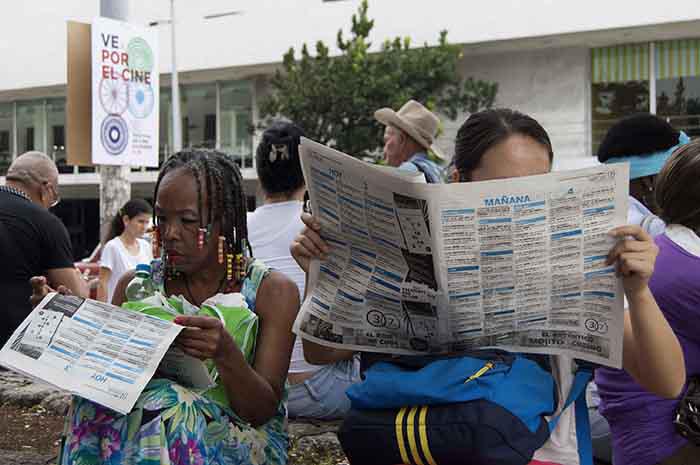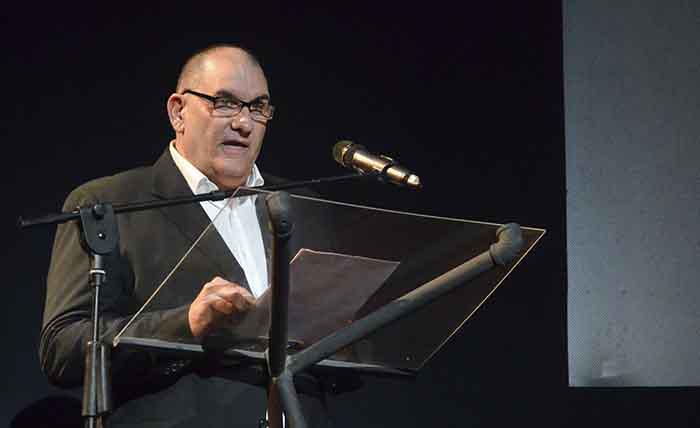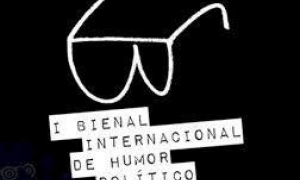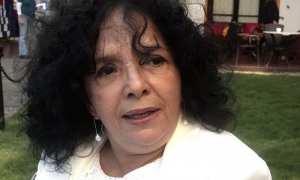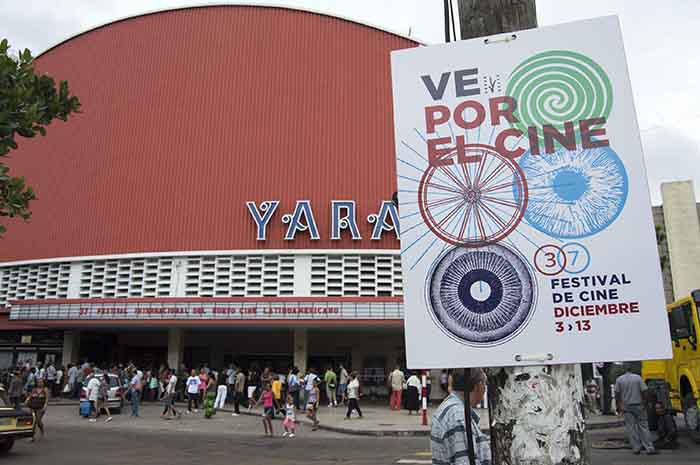
Cinema is the key word, according to Iván Giroud, director of the International Festival of New Latin American Cinema, who highlighted the importance of “loving cinema, defending, protecting, conversing with it, enjoying it…maintaining it as a top option for audiences faced with innumerable audiovisual options.” It is within this context that spectators are being given the opportunity to enjoy over 400 films, including 138 feature length and short productions, documentaries, animations and debut works from the competition selection, as well as screenings of films in other categories, such as galas, thematic showings, specials and tributes.
According to debut director, Pablo Trapero, after 37 editions of the Havana Film Festival, which sees productions from the region shown on cinema screens city-wide, it is comforting to know that Latin American audiences are responding well to his creations.
Trapero’s film, El Clan, chosen for the inauguration (December 3) is a box office hit in his native Argentina, where it has been positively received.
The macabre story, told by Trapero, of the Puccio family, involved in abductions and murders in the Buenos Aires neighborhood of San Isidro during the 1980s, is up for a Coral Award.
The festival is another opportunity for reencounters. On the terrace of the Hotel Nacional we find Ruy Guerra, prominent figure of Brazil’s Cinema Novo movement, who received the Coral Award of Honor in recognition of his long career with films such as Estorvo, Me alquilo para soñar (six episode series), Os amores difíceis, A ópera do malandro, and Erêndira (based on the novel by Gabriel García Márquez).
You are one of the maestros of Latin American cinema, how do you view it today? It’s difficult for me to talk about Latin American cinema in general because not many films from other countries are shown through our distribution and screening system. The Brazilian film industry normally works in cycles, there are moments which see the rise of an important movement and suddenly a decline, it depends on the economy. Television is currently having a great impact. Many film makers are producing comedies because it’s the easiest way to get production opportunities. It’s difficult to do anything else, as other genres require a lengthy process and the proposal has to be very interesting in order to secure financing, what is more, the public doesn’t respond too well to these types of films, despite their quality due to the impact of television.
There are currently a lot of film festivals in Latin America…
I have been slightly removed from this process, writing scripts and making my own films, but yes, there are many festivals, something I believe to be very important regardless of their format or number of films presented. These festivals represent the flame which keeps something so essential alive, the pleasure of cinema, and inspires new generations of film makers. A festival, no matter how simple, always looks for something different and to provide opportunities to film makers, as well as brining together different generations and countries. It might only seem like a drop in the bucket, but these encounters are very important, they are platforms from which to promote reencounters, information, vital to the development of cinema.
You have received the Coral Award of Honor… This award means a lot to me. I have long-standing ties with the Havana Film Festival. I have brought over my works, filmed a series here, visited the San Antonio de los Baños School of Cinema. I have come to Cuba on many occasions, it’s a country for which I feel immense affection and I have great friends here.
Also commenting on her love for Cuba and happiness to be here, Geraldine Chaplin spoke to Granma International in the Hotel Nacional’s 1930 Hall. ”I’m happy to be here. I’ve come with a great responsibility (president of the feature length fiction film judging panel) and above all with an enormous craving to see Latin American films, because I believe that it’s here in Latin America where something is really happening with cinema. It’s the type of cinema I want to see.”
You won the Coral Award for best female actress in the 2014 edition of the festival for your performance in Dólares de Arena…
I think it’s the best film I’ve ever made, and one of the best I’ve ever seen. It’s fantastic, very subtle; it says everything without spoon-feeding you all the information.
You attend many festivals all over the world, what does the Havana Film Festival mean to you?
It’s always been special to me ever since the first time I came, 30 years ago. I have also come on visits, last year when I was still working on the film I couldn’t attend, but now I’m back and want to see Cuban productions.
Geraldine is the daughter of one of the most creative artists in the history of cinema, Charles Chaplin.
What responsibilities does the surname Chaplin carry? None, it opens all doors, its fantastic, a real gift. It’s great to be the daughter of a global hero, he is my hero and has left a legacy for all generations across the world and I feel so proud.
What are you currently working on? I just finished a horror film in Rome. I’m now doing horror, I have played all the sweet grandmothers and now I’m doing terror. I have also done a French comedy (Au delà des murs, by Hervé Hadmar) and A monster calls (by Juan Antonio Bayona) with Sigourney Weaver and Liam Neeson. I have done quite a lot this year.
Of all your films, which is the most special to you?
The one I feel the most strongly about is Dólares de arena (by Laura Amelia Guzmán, Dominican Republic), without a doubt. I also like Nashville, and working on others by Saura - a very lovely time - such as Peppermint frappé, Ana y los lobos, Cría cuervos, Mamá cumple cien años. Oh! I have also worked with Jorge Sanjinés on Para escuchar el canto de los pájaros. We shot the film in Bolivia at an altitude of 5000 meters. I have always admired Sanjinés’ work, and never thought I would participate in one of his films; but he wrote a script where there was a European woman who had married a shaman, and he chose me!
Luciano Castillo, director of Cuba’s National Film Achieves, spoke to GI about another aspect of the Festival, the strong Italian presence this year. “We have put together a program which includes a retrospective of works by the great director Marco Bellocchio, visiting us for the first time, showing at the 23 y 12 Cinema. I would like to highlight that thanks to the collaboration of a group of Italian cultural institutions this theater, headquarters of the National Film Achieves, has been provided with new digital technologies and equipment to ensure quality screenings. 23 y 12 will also host tribute screenings in honor of Mario Monicelli on the 100th anniversary of his birth with showings of his restored films, such as Queremos los coroneles, a hilarious satire featuring Ugo Tognazzi”.
Every part of the film making process is important, but the key is the script. In this regard, GI spoke to Spaniard Manuel Gutiérrez Aragón, director, script writer, author, and judge of the Unpublished Script competition.
Also a member of the Royal Spanish Academy of Language, Aragón has over 20 films to his name (Demonios en el jardín, Camada negra, in 2008 he shot his most recent work, Todos estamos invitados) and has produced around 30 scripts.
What is an important feature of all festivals?
Country to country communication is increasingly complicated and people are watching films on television and not in cinemas. Festivals provide a link for film makers from all over the world to see our works. As well as being glamorous events, their main aim is to show what is being done. Cinema continues to be a testimony to reality, and despite the wide variety of formats, it is through film that we learn about how people from other countries think, dress, love and hate. The Havana Film Festival in particular is a reference for the rest of Latin America.
Wdo you look for in a script?
To be surprised by some original feature, to be excited, and the most difficult thing, to hold my interest until the end.
Tell us about the Unpublished Script Award…
It’s an important award because it has given rise to significant films; Fresa y chocolate for example. I don’t think it’s as decisive as it used to be, but an unpublished script award from the Havana Film Festival always attracts the interest of producers. All interviewees expressed the same sentiment: The most important thing is to see and appreciate film. In this regard the Havana Film Festival has an impeccable record.
